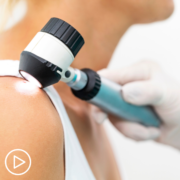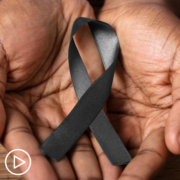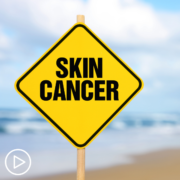What Are Treatment Goals and Considerations for Advanced Non-Melanoma Skin Cancer?
What Are Treatment Goals and Considerations for Advanced Non-Melanoma Skin Cancer? from Patient Empowerment Network on Vimeo.
Skin cancer expert Dr. Vernon Sondak reviews current treatment goals for advanced non-melanoma skin cancer patients. Dr. Sondak discusses factors to consider when making treatment decisions, including age, lifestyle factors, and potential treatment side effects.
Related Resources:

|

A Review of Current Advanced Non-Melanoma Skin Cancer Treatment Options |

How Can Advanced Non-Melanoma Skin Cancer Patients Participate in Their Care? |
Transcript:
Katherine:
There are so many factors that come into play when making a treatment decision, including a patient’s age and overall health. So, let’s walk through the considerations when choosing therapy for advanced disease. What are the treatment goals? What does that mean and what are the goals?
Dr. Sondak:
It’s actually really important and somewhat underrated to think about, “What’s the goal of the treatment?” I think even doctors sometimes, certainly medical students and trainees, it’s something they have to learn a lot about. Because it’s easy to memorize all the names of all the drugs and all the muscles in the body. But thinking about, “What are we really trying to accomplish here?”
The first thing we would like to accomplish, when we can, is cure the cancer. Most of the advanced skin cancers we’re talking about are still curable. We can’t say all, but most. Even in the high stages they are still potentially curable with treatment.
So, of course, if we can cure someone, we might be more aggressive with our treatment plan. More intensive with our treatment than if we’re not intending to cure them. Why wouldn’t we want to cure them? Why would we have a different intention? We’d always want to, but there are times when we say, “Gee, the standard treatments haven’t worked. Now we have to think about what other goals? We can’t cure you anymore.”
It’s pretty rare with skin cancer. But it happens. It happens with melanoma, and it happens with basal, and squamous cell cancers, but rarely.
We can’t cure you. We can help you feel better because the symptoms that this large skin cancer – this advanced skin cancer – is causing. Whether they might be bleeding, or pain, or pressure on a nerve, or whatever it might be. If we can relieve that, that’s palliation. That’s relieving symptoms. There are times we say, “We want to prevent that symptom from happening in the first place. If we don’t remove this, this is gonna start bleeding, or it’s gonna press on the nerves.”
So, even if we can’t cure you, we might want to treat one or more spots to prevent symptoms from occurring. Only in the most extreme, end of the line, kind of situations would we say now our goal is just comfort. We can no longer do anything to really alter the disease. When and how we make those decisions, obviously, they are challenging. But if you don’t start with that point, then you can’t get to the right treatment decision.
If you’ve got a patient who’s not curable, you want to do the least treatment to make them feel better or prevent them from feeling bad. Whereas if you’ve got a patient who is curable, you may be willing to justify much more aggressive treatment, if that’s what’s needed to cure them.
Katherine:
How do patient specific factors, like lifestyle and pre-existing conditions, impact treatment choices?
Dr. Sondak:
It really depends, but in skin cancer it can affect them a lot.
Number one: Lifestyle. Well, how did we get skin cancers in the first place? Whether they’re melanoma, basal, squamous? Usually, the one common denominator is ultraviolet light. Got it from being out in the sun or occasionally from being in a tanning bed. Something like that. Melanomas, and to a small extent basal cell cancers, tend to be associated with brief intermittent heavy exposure, meaning sunburns. Squamous cell cancer tends to be associated with chronic cumulative years of sun exposure. I was out in the sun all my life, I fished all the time, I was a lifeguard, what have you. That’s generalization.
A lot of overlap. But the common denominator, the common theme, is ultraviolet exposure. One thing about the sun, it doesn’t just shine on one spot all the time. It shines on lots of places. So, you may have a skin cancer here, but that doesn’t mean you didn’t get sun exposure there, or here, or anywhere else.
So, lifestyle factors. One: We can’t undo the ultraviolet exposure you already had. But we can prevent it from accumulating further. So, once a person is diagnosed with skin cancer, they really need to think about protecting themselves from the sun, avoiding sun exposure, and covering their skin, and protecting their skin when they’re in the sun. Ideally, they think about it before they got skin cancer. So, they don’t get skin cancer. Or if they get it, they get a mild, minimal, non-advanced, and easily treatable case.
But we want to make sure that once a person has skin cancer, that they recognize that their lifestyle needs to change. Cigarette smoking, unbeknownst to a lot of people, is also associated to some degree with skin cancers and a lot of other big and bad medical problems. So, we would love to alter people’s lifestyle as far as smoking is concerned. Those are the couple of key lifestyle factors that we always think about.
I think the other area that is so important in deciding about treatment is the overall health of the patient, other medical conditions that they might have, and then lastly, what the patient’s own specific concerns and considerations are.





